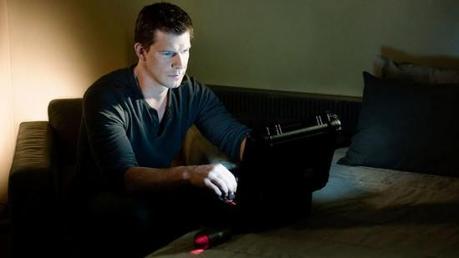Contributor: Bronzethumb
If you’re a slow runner, you don’t enter an Olympic sprint event. If you’re not so good with sums and figures, you don’t try to make a living as an accountant. This seems like conventional wisdom, yet in episode 7, “Outcasts” attempts to do a strong character-centric despite it’s very weak, thiny-drawn characters, and shunts the much stronger ongoing storylines into the background. And yet somehow, the episode is better than it has any right to be.

The A-story sees Cas in the middle of a something straight out of a hardboiled detective novel: his secrets are threatened, his one night stand is missing, the rest of PAS is hunting him without realising, and somehow Cas has to resolve the whole situation without ending up in prison or getting killed. The writer of the episode made a very good call in making a very centric-story about Cas, because he’s probably the only character in the ensemble (other than Julius Berger) who could carry it off. As with all the others, he’s had very little depth and development over the course of these seven episodes, to the point where there are only two real aspects to his character – his love for Fleur and his secret past – but they’re played so well against each other that the rest of the A-story can hang off him and still work. And Daniel Mays really takes advantage of having something to sink his teeth into, giving what is easily his best performance of the series in his confessions to Fleur and the quieter moments that follow.
There’s also a nice film noir vibe running through the episode. The plot is pure hardboiled in all the best ways, from Cas as the lone detective with a shady past to Carla the femme fatale (at least, initially), but more than that, the way the episode is constructed evokes the feeling of that genre. As the minutes tick by, it feels more and more like Cas is being boxed and buried by the situation unfolding, creating a very claustrophobic tone through the way characters encroach on Cas’ personal space, to the very literal boxing in that happens in PAS, to the final confrontation at the end of the episode which goes even more literal. There are also nice visual touches that evoke film noir, like the oversaturated sunlight (most of the outdoors scenes seem a bit tweaked, but they were kicked up a notch several times in this episode) and the use of big vertical and horizontal lines cutting through the background or foreground of a scene. All in all, this was a character storyline better-crafted than any other we’ve seen in “Outcasts”, and it’s a shame it came so late in the series’ run.
The B-story of episode 7 deals with what has become to overarching plot of the series, Forthaven’s conflict with the ACs and with whatever else is living on Carpathia. The show gets points for a very strong, direct opening: a second Richard Tate, appearing in his home and threatening to kill the Forthavenites like they did the previous hominid inhabitants. But from there, this storyline goes downhill very fast. The moments with Stella and Tipper as they try to decode the signal that the natives are using to communicate felt very pointless: in the first scene of this sequence, Stella finds the signal, and every time we returned to this aspect of the B-story it just reiterated something we already knew. The characters and the actors felt wasted, even by “Outcasts” standards. And meanwhile, Richard marches into the mountains to speak with Rudi, who might just be the most boring, unthreatening antagonist ever. He declares for his followers to hear that he hates Richard and dreams of destroying him, but the delivery was so flat, so devoid of emotion, that it sucks any tension out of the scene. It goes beyond simply flat writing: the actor playing Rudi was woefully miscast and is probably one of the show’s biggest missteps.
The saving grace of the B-story proved to be Julius Berger yet again, as the alliance between him and Jack is further solidified by the events of the episode. Despite his consistently antagonistic characterisation, we do get to see several sides to the character: his scenes with Richard have a lot more conflict to them as Julius’ anger and frustration and his want for power really show; in the scenes with Jack he’s much calmer and very serene, playing the role of the calm and determined leader that Richard had a monopoly on at the beginning of the series; and in the moments at the end of the episode, when speaking with the transport ship, there’s something of a subservience and almost – almost – a vulnerability, the only time that the audience gets the sense that Julius isn’t completely self-reliant or completely confident.
Storywise, Julius keeps pushing for a path of destruction and being a thoroughly entertaining spanner in the works to Richard and Stella, influencing what Jack and the rest of the expeditionaries wind up doing at the end of the episode and turning the people of Forthaven further against their current government and towards an all-out war with the ACs. It promises big stories and big conflicts for the final episode – though “Outcasts” doesn’t have the best track record for delivering on promises.
Episode 7 manages to completely flip the usual dynamic of the show and make it work, ballsing up the overarching storylines of Forthaven’s survival on Carpathia while giving the viewers a very character-centric storyline that easily trumps the rest of the episode. But it might be a case of too-little-too-late on the character front, and the fact that “Outcasts” has fumbled its ongoing story arcs for two episodes in a row doesn’t bode well going into the series finale.
Rating: 7/10

